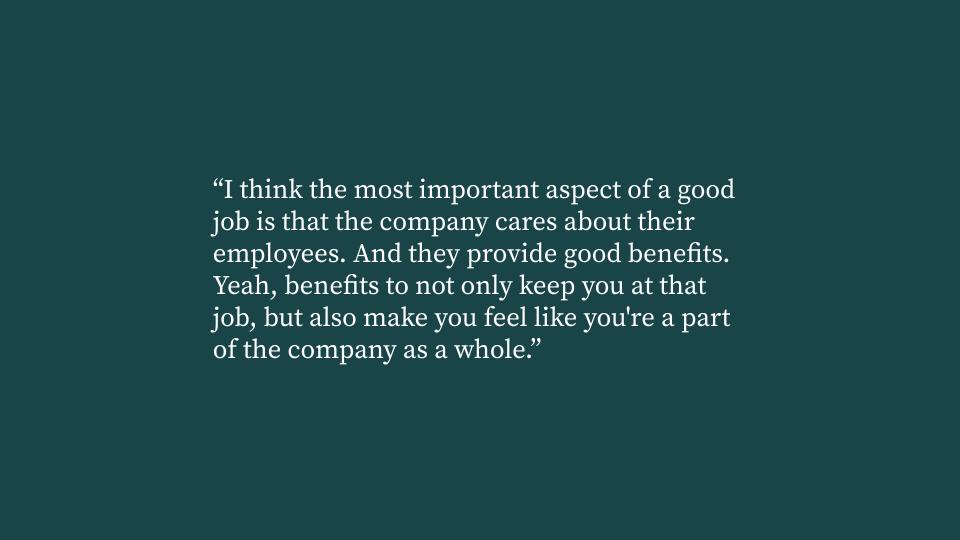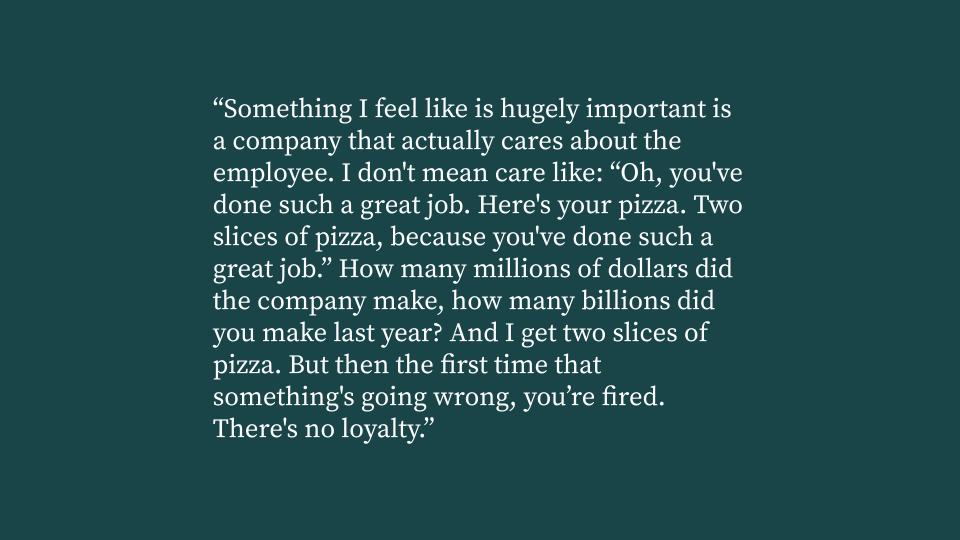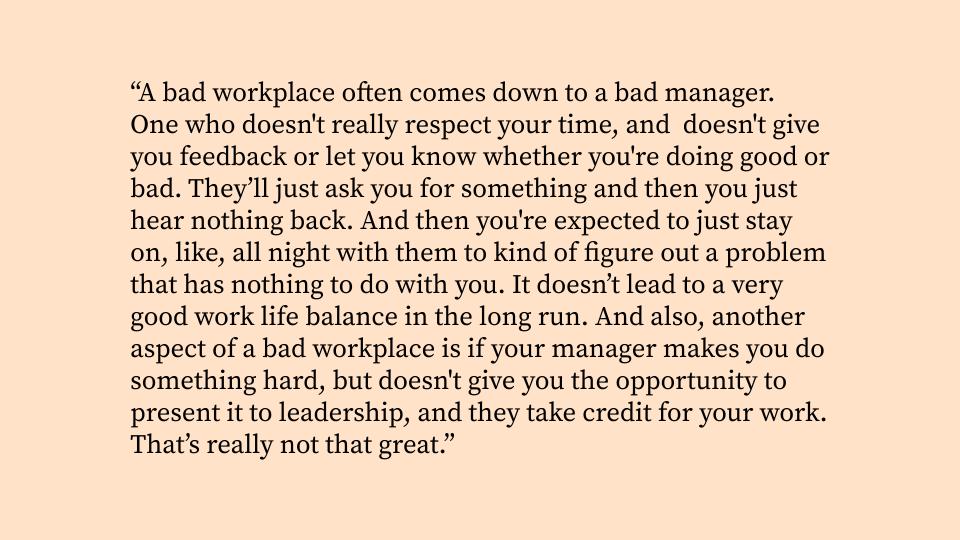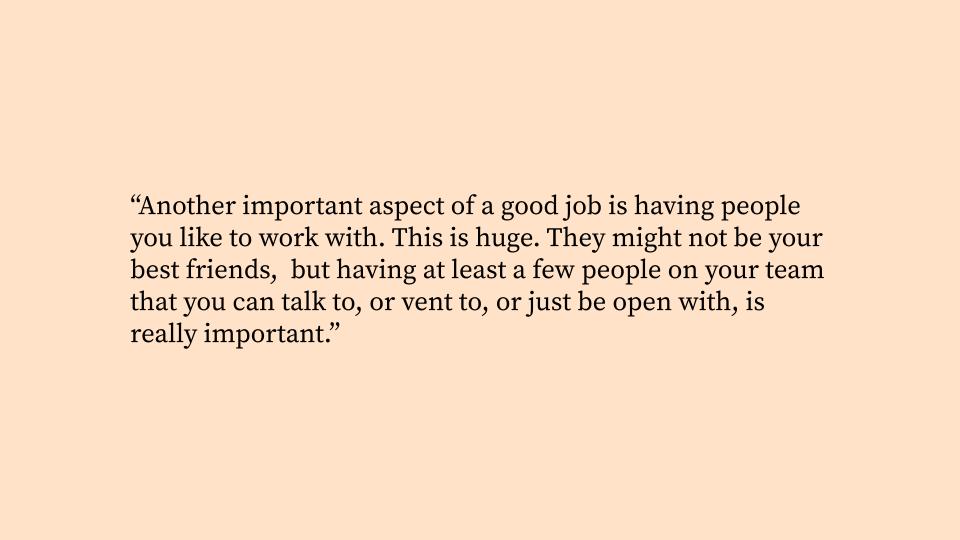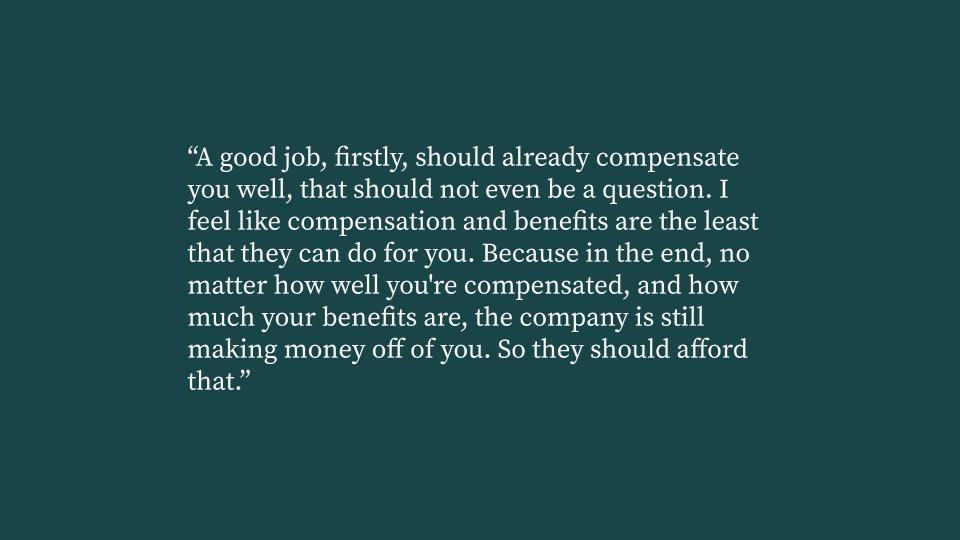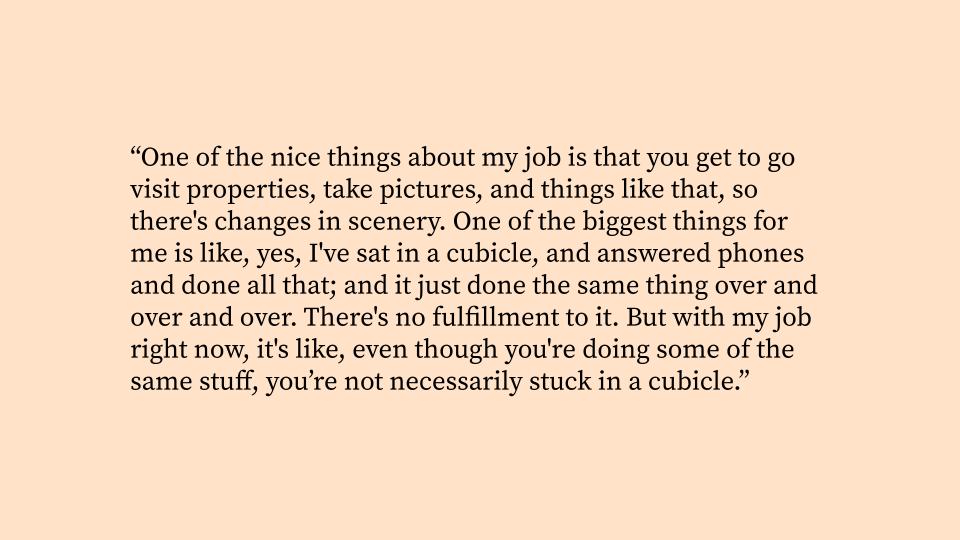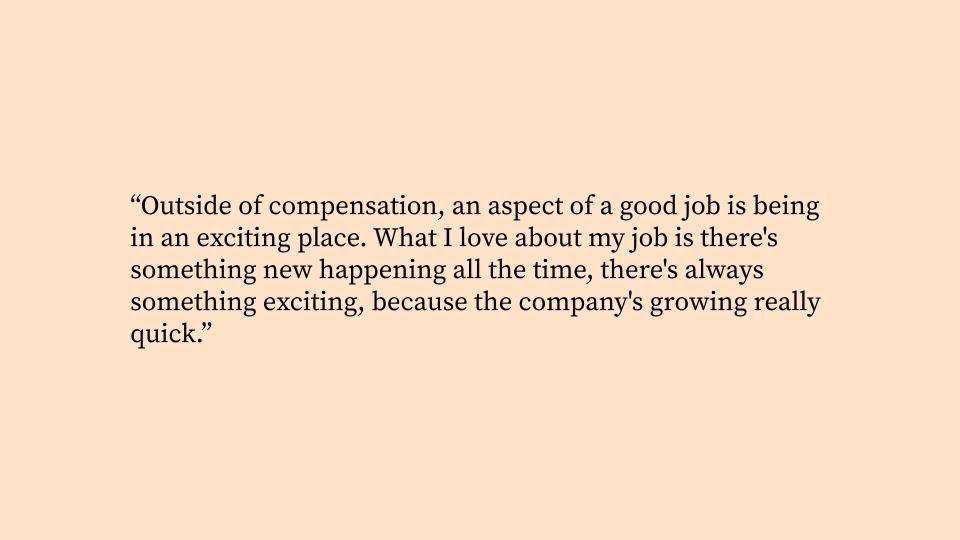
Now we get to the heart of the section. Like mentioned on the home page, people are starting to want different things out of work. This central question this section asks is: what does sustainable work look like to you?
There seems to be a narrative going on that makes it out that people don’t want to work anymore. But through these interviews, I found that that’s not necessarily true.
One respondent said that:
“People don’t say that they don’t want to work. They want work to treat them like people, to realize that they have lives outside of work, and be okay with that.”
Throughout this section, we find that people want to be treated as people, not just as workers. They want flexibility, understanding and adequate compensation. But they also want fulfillment, interaction, and growth.
To develop a definition of what a good job looks like, I first explored the problems people had with the workforce. To understand this, I asked workers: “What are the problems you have with work?” Their answers were diverse, ranging from problems with upper level management, to a lack of time in general.
One problem that workers had was that their salaries weren’t competitive. Inflation varies every year, and in recent years, it’s only been going up, driving the cost of living up too. And most workers found that their salaries weren’t getting adjusted every year, making them lose money. Additionally, companies would be hiring new workers at those adjusted rates, essentially punishing employees for loyalty.
This connects to how workers want loyalty from their companies. There has been a lot of rhetoric going around that this generation of workers aren’t loyal, or they have no sense of pride in their work. But as we’ve seen, when salary is so important to workers, if the company isn’t loyal to them, isn’t taking care of them, they will seek alternate opportunities.
As two workers put it:
“My company is not compensating me enough, especially for the market value. They have not been increasing salaries, and they don’t see it as a problem now, but it’s causing a lot of burnout and will become a problem eventually.”
“One problem I have is the lack of adjustment of salaries for inflation. I’m not getting any adjustment at my current job, which is annoying, because like people who are getting hired now at my job are getting hired on at this higher rate. Since I’ve been here for longer, it almost feels like I’m getting punished for being loyal to the company, which is really frustrating to me.”
This also relates to the problem of overtime pay. In salaried work, which most white-collar jobs are, you aren’t paid by the hour. This can be a good thing and a bad thing. This means that sometimes you can get paid for time you’re not doing much, but it also means that companies can demand work that exceeds a 9-5 time frame, and makes workers work for less than the agreed salary.
One respondent explains it like this:
“During my company’s busy season, I was working upwards of seventy hours a week, but not making overtime pay or anything. And when I calculated out how much money I was making per hour, based on my salary, I was making less than minimum wage, when you took in those extra hours I was working.”

The workers also mentioned how they felt like they weren’t being valued, both as workers and as people.
One worker put it:
“Right now in my organization, there’s like a large disconnect between what upper management thinks we’re doing and what we’re actually doing and the kinds of situations we’re actually in. They don’t know, or care, that a majority of people are unhappy and are extremely overworked. And no one really seems to care, because we’re floating by, but we’re floating by by sacrificing everything else in our lives. And eventually that’s going to catch up to people, but upper management is not going to understand unless it hurts their money. It feels like that’s all it comes down to.”
These problems with not feeling valued or appreciated largely reflect problems with office politics and bad management.
“A bad workplace has leadership that sucks, that won’t advocate for your promotion. Or there’s not a lot of opportunity for upwards mobility. At my last job I was doing so much work, but I wasn’t getting appreciated for it.”
“A bad workplace often comes down to a bad manager. One who doesn’t really respect your time, and doesn’t give you feedback or let you know whether you’re doing good or bad. They’ll just ask you for something and then you just hear nothing back. And then you’re expected to just stay on, like, all night with them to kind of figure out a problem that has nothing to do with you. It doesn’t lead to a very good work life balance in the long run.
“At every job that I’ve been in, it doesn’t really matter how well you perform sometimes. But like, if you know someone, then you’re more inclined to get promoted quicker or get a raise just because you know someone who knows someone or you’re buddy buddy with someone. I would say I have seen office politics in almost every job.”
So ranging from office politics to compensation, people have problems with work.
However, there are workplaces that do provide positive things for their employees. When workers had fair, adjusted salaries, they were, in general, more content with their jobs.
“When I first started working a year ago, I was getting paid 65k as a junior software developer. This year, the new junior software developers I got hired are making 85k, when I was making 65k, at the same starting point. But luckily, my company matched all the people who are in the junior developer program and also matched our time at the company as well. I’m fortunate to have a company that will be transparent with their salaries and things like that. But I feel like a lot of companies probably won’t do that.”
“I mean, I wish I was paid more. I can probably get a higher base salary and bonus somewhere else, but my company’s equity is really good. Very good and very stable. And they give us bonuses out of the blue, and they raise our salary every year. That’s nice. Compared to other companies, I think that my company does a pretty good job at making sure we’re pretty well compensated.”
This section isn’t intended to be negative about work, but to explain what isn’t working for people. As we develop a sense of what we want work to look like, it’s important to know what we don’t want it to look like. In the next sub-section, I explore what some people found were good aspects of work.
After exploring what people thought were aspects of a bad job, I then asked people what they thought were the aspects of a good job. There were a lot of different answers, and this section is divided into five sections, corresponding to the five different aspects of a good job I found in the interviews.
1. To be treated like a human
2. To have good workplace structure and leadership
3. Adequate compensation
4. For work to be engaging
5. To see your work helping others
1.
The first, and almost the most popular, was that workers wanted to be treated like a human. More than a “cog in the machine”, respondents wanted to be valued for their individual contributions, their original thoughts and opinions, and the value they brought to the company as people.
This included flexibility, work-life balance, and loyalty. They wanted flexible work schedules, enabling them to work at asynchronous and non-traditional work hours if necessary, but also allowing them to not have to do work when they don’t need to. They also wanted their work to value them as individuals, and be taken care of in exchange for their hard work and loyalty.
Right now, there’s a discussion going on about loyalty. On one hand, owners and managers say there is no loyalty among this generation of workers. On the other hand, workers say that their companies don’t care about their workers in order for them to remain at the company. Reconciling these things will be one of the biggest challenges regarding creating sustainable work practices. Through the responses, we find that workers feel like that sense of mutual loyalty has been disappearing. It’s not that they don’t want to be loyal to one company, they just don’t feel like there is a culture of loyalty anymore, from both sides.

One respondent put it as:
“I was definitely raised with the idea that you should take pride in your work. And if you work hard, it will have rewards. And also the idea that you should have some sort of loyalty to the company that you’re with, and because of that, the company will have loyalty to you. But from what I’ve seen, as I’ve been applying for my own jobs, and as my friends have been working, it seems like those ideas are less prevalent at this point. Now there’s less loyalty to a company, and also people that are becoming more cynical about how their work is rewarded. People are realizing that even if they work so much better than their peers, sometimes they don’t get any compensation for it.”
2.
This also speaks to the desire for a workplace to provide growth opportunities. We find that a good workplace wants the employee to succeed. This can be in the form of meaningful personal development or providing internal growth/promotion opportunities. Respondents emphasized that a good workplace wants you to succeed, and demonstrates this commitment by valuing you as a person, as well as investing in your future.
One respondent put it:
“An important aspect of a good job is to have an environment that fosters growth. A good job should want you to learn. They should want you to have upward mobility and want you to be able to succeed, because that shows that they care too. It’s in both parties’ best interest to foster that.”
This goes hand in hand with good management and a good workplace environment. Multiple respondents emphasized the value of a good manager, and the misery of a bad one. They want managers who are responsive and take interest in their employee’s success.
They also want a comfortable workplace environment, one with reasonable expectations and one where employees understand the decision making process. Work shouldn’t be too hard, but also not too easy. They want to be doing valuable work in a place they feel comfortable in.
As respondent puts it:
“In terms of fulfillment, everyone wants to feel like what you’re doing is valuable.”
Similarly, another respondent explains the importance of understanding what you’re doing in the bigger picture:
“When you are working, you should be able to really understand the importance of what you’re doing. If you’re working in a really large organization, everything you’re doing is a small part of a larger process. For example, if I’m just running Excel models, that’s going to be part of a much larger deal down the line. And I’ll be working on just that small aspect, but as I understand what I’m doing and how it correlates, or how it functions in the grander scheme of the machine, so to speak, I think it would bring a lot of fulfillment, especially when you know, like you worked on something from start to finish and you get to the end goal.”
And some, while they (like most!) mentioned adequate compensation being the primary aspect of a good job, a good workplace environment was another important aspect to them.
“While I do think adequate compensation is really important, I think that communication is also hugely important. Because if you’re working in a team setting, and you’re not communicating with people around you, it doesn’t really matter how well you’re being paid, it can just be a miserable experience.”
3.
The most popular answer people gave for what are the aspects of a good workplace was that everyone was looking to be fairly compensated. Fair pay in the form of income, but also through benefits and paid time off. Compensation was really important to the respondents, either for the purpose of providing for themselves and their family, or providing for rich experiences outside of work.
4.
But aside from being fairly compensated, people wanted to be engaged. They want to be able to move around and interact with people.
They also all hold “the cubicle” in great contempt.
One respondent put it:
“Personal engagement with other people is really important to me. I couldn’t have an office job. I want to be able to communicate with people and learn from people. I also think something that’s dynamic, something that’s not always doing the same task, is really important to me.
Then of course, economics is important. So I would put that at the top as well. If I was choosing between two jobs, the economic component is going to be really important in choosing between one or the other.”
5.
But aside from engaging work and adequate compensation, respondents want to see the impact they are making. They want to be fulfilled (to some degree) by their work, and see the value they are producing.
When asked about the important aspects of a good job, this respondent said:
“Adequate compensation for sure. But also, I couldn’t do a boring desk job, not interacting with patients. That’s something that I feel strongly about, just being able to see the impact I’m making. That’s definitely something I consider when I think about my career.
Another respondent put it differently:
“I would say that an important aspect of a good job is having fulfilling work, something you’re excited about. I always gauge how good my day is when I come home, and when I see my wife, and I’m like: ‘Oh, I really want you to tell you about this thing we did’, that’s a good day.”
Question: What are the aspects of a good job?
When considering this question, draw back on what you said you worked for. What is meaningful to you, and what aspects of your job should enable you to pursue that? What do you want to look forward to every day at work, and what feels fulfilling to you at the end of the day?
I think a good job is one that is flexible, and a workplace that cares about the employee.

So, what do people want work to be?
In this section, I found that people actually do want to work. They just don’t want to work for places that don’t value them.
Workers want work to:
Care for them as people, not just employees.
They also want their workplace to have a good environment. They want friendly coworkers, good leadership, and growth and development opportunities.
They want work to be engaging. They want to interact with people, and they want to see their work making an impact.
And finally, workers want to be adequately compensated. This can be in the form of benefits, paid time off, salary, and the adjustment of their salary for inflation and seniority.


